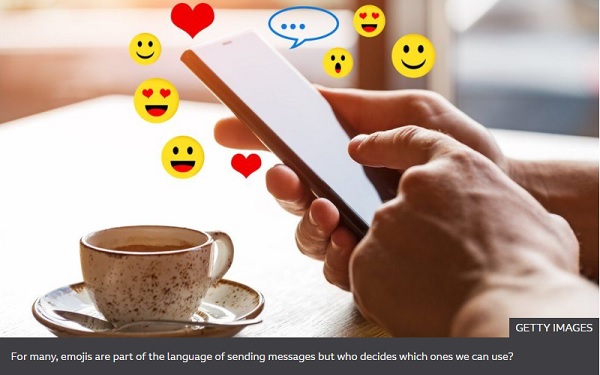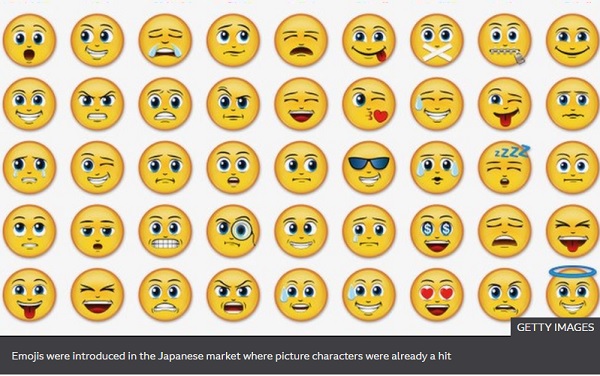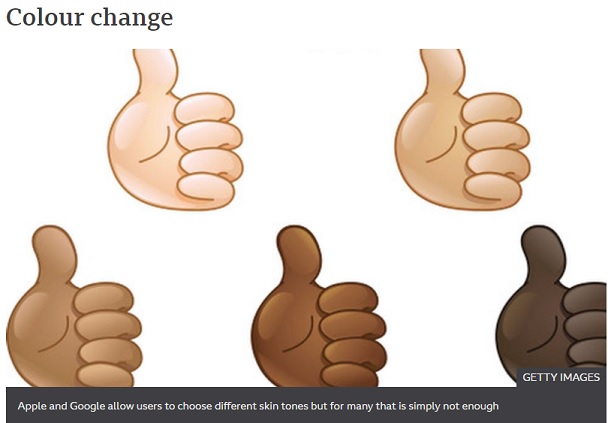
Do you have a favourite emoji? Maybe it's the wink or the face rolling around with tears of laughter. Perhaps if you're feeling slightly more sardonic, it's the smiling face with jazz hands.
With more than 3,000 to choose from, there are plenty of options.
But what happens when the one emoji you want isn't there?
Rachel Murphy works at DroneUp, a drone services company based in Virginia Beach in the United States.
"Every day I'm writing tweets, I'm making posts, and my kneejerk reaction is to get people excited by including an emoji," she says.
But the absence of a drone symbol on the list means Rachel has been forced to use the helicopter or flying saucer instead.
"Those really don't cover what a drone is, and they don't really act as an adequate replacement for it."
Rachel started researching who controls emojis and how she can get a drone added to the official list of characters, which is updated every year or so.
White and male
New proposals are approved or rejected by a group known as the Emoji Subcommittee, part of the Unicode Consortium, a not-for-profit organisation made up of representatives from most of the world's biggest tech firms including Google, Microsoft, Adobe and Huawei.
They meet regularly in Silicon Valley, California, and vote on draft emojis, the ideas for new characters which can come from anyone and anywhere. It's an entirely open submission process.
But who are the people sitting round the table deciding if a proposal gets the nod and is added to every single smartphone or rejected outright?
The group is "mostly older, mostly white, mostly male", says Jennifer 8 Lee, co-founder of a group called Emoji Nation, which helps people propose new emojis. She has the figure 8 as a middle name.
She likens turning up at an Emoji Subcommittee meeting to a religious gathering. "It totally had the vibe of showing up at a new church for the first time, it's lots of older, nice white people," she says.
Rachel Murphy's research led to her and her DroneUp colleague Amy Weigand carefully drafting a proposal and making the case for a drone emoji. They included statistics of drone searches online, sample artwork, and an impassioned plea to Unicode.
"The main reasons drones are being used is to save lives, search-and-rescues and finding missing people," says Ms Weigand.
But it wasn't to be. Unicode rejected their proposal.
"We were quite shocked when we got the news," said Rachel. The Emoji Subcommittee said a drone was quite new technology and may not have longevity. "Respectfully, we strongly disagree," she said.
Japanese market
Scroll through the emoji keyboard and you'll see plenty of pictures of redundant tech: a pager, a fax machine, even a floppy disk because once an emoji is added, it never gets removed. As a result, Unicode is wary of adding more symbols that it fears could end up pointlessly cluttering the keyboard in just a few years' time.
But for Ms Weigand it's baffling that so many outdated devices get to exist as symbols on all the world's smartphones, while new technology like a drone is rejected.
"I haven't seen a floppy disk probably since the 1980s," she says. Clearly frustrated, Ms Weigand asks: "Who are you Unicode, and who do you think you are?"

The man behind the group is Mark Davis, who looks uncannily like the wizard emoji. He's the co-founder and president of the Unicode Consortium and he was instrumental in the launch of a global emoji set.
When he formed the Consortium in the early 1990s, Unicode's goal was to encode all the world's languages into a universal system that would allow digital texts to be accurately uploaded and downloaded, no matter what language they were in, where - or on what device - they were being read.
"Before that it was really a Tower of Babel," Mr Davis says.
Fast-forward to the late 2000s when tech giants Apple and Google wanted to enter the Japanese market with products such as Gmail and the iPhone. Billionaire technology entrepreneur Masayoshi Son advised the Californian firms that if they wanted to succeed in Japan, they should offer emojis - because the "picture-characters" or "e-moji" were already a hit with users.


